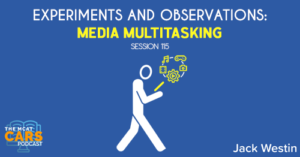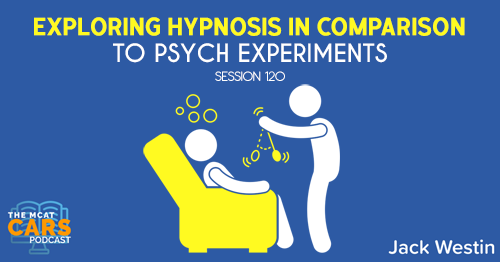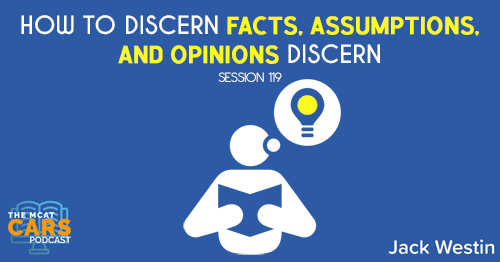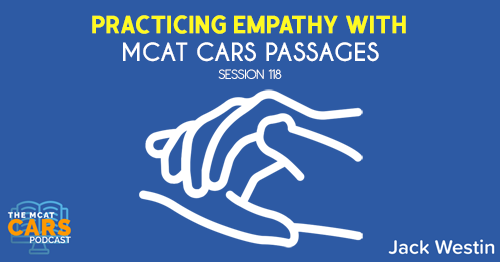Apple Podcasts | Google Podcasts
Session 115
Experiment-based passages are found all over the MCAT. Today, we focused on following the details of the passage and keeping track of the different ideas.
As always, I’m joined by Jack Westin from JackWestin.com. Check out all their amazing free resources including a free trial session of Jack’s full course to see how it’s like learning from Jack Westin himself.
Listen to this podcast episode with the player above, or keep reading for the highlights and takeaway points.
Link to the article:
https://www.scientificamerican.com/article/media-multitasking-disrupts-memory-even-in-young-adults/
The bulky, modern human brain evolved hundreds of thousands of years ago and, for the most part, has remained largely unchanged. That is, it is innately tuned to analog information—to focus on the hunt at hand or perhaps the forage for wild plants. Yet we now pummel our ancient thinking organ with a daily deluge of digital information that many scientists believe may have enduring and worrisome effects.
A new study published today in Nature supports the concern. The research suggests that “media multitasking”—or engaging with multiple forms of digital or screen-based media simultaneously, whether they are television, texting or Instagram—may impair attention in young adults, worsening their ability to later recall specific situations or experiences.
The authors of the new paper used electroencephalography—a technique that measures brain activity—and eye tracking to assess attention in 80 young adults between the ages of 18 and 26. The study participants were first presented with images of objects on a computer screen and asked to classify the pleasantness or size of each one. After a 10-minute break, the subjects were then shown additional objects and asked whether they were already classified or new. By analyzing these individuals’ brain and eye responses as they were tasked with remembering, the researchers could identify the number of lapses in their attention. These findings were then compared to the results of a questionnaire the participants were asked to fill out that quantified everyday attention, mind wandering and media multitasking.
Higher reported media multitasking correlated with a tendency toward attentional lapses and decreased pupil diameter, a known marker of reduced attention. And attention gaps just prior to remembering were linked with forgetting the earlier images and reduced brain-signal patterns known to be associated with episodic memory—the recall of particular events.
[02:34] Paragraph 1, Sentence 1
The bulky, modern human brain evolved hundreds of thousands of years ago and, for the most part, has remained largely unchanged.
Jack says:
Be very careful how you interpret this, but you should just take it as the author thinking that our brains are not very different today than it was back then.
[03:36] Paragraph 1, Sentence 2
That is, it is innately tuned to analog information—to focus on the hunt at hand or perhaps the forage for wild plants.
Jack says:
It’s just describing what our brain is for, which is to feed ourselves.
[03:56] Paragraph 1, Sentence 3
Yet we now pummel our ancient thinking organ with a daily deluge of digital information that many scientists believe may have enduring and worrisome effects.
Jack says:
Note that this is the opinion of the scientists. The author hasn’t directly tied it to their opinion yet. It’s leaning that way or why else would the author bring it up? But the author’s saying this is what others say so keep track of So
'Keeping track of who says what is very important on this exam. Whether it's a group of people, the individual, the author themselves, just keep track of ideas and who says them.'Click To Tweet[05:17] Paragraph 2, Sentence 1
A new study published today in Nature supports the concern.
Jack says:
The author is beginning this paragraph with a new study published supporting the concern. The author potentially leaning into this a little bit but they’re still capable of contrasting whatever opinion other people came up with.
[05:57] Paragraph 2, Sentence 2
The research suggests that “media multitasking”—or engaging with multiple forms of digital or screen-based media simultaneously, whether they are television, texting or Instagram—may impair attention in young adults, worsening their ability to later recall specific situations or experiences.
Jack says:
You can imagine kids sitting down and scrolling around Instagram, watching TV, playing a video game, doing everything at one time. Maybe these kids are just smarter than us and more capable and more focused. But at least we have to go with whatever the author says here.
[07:33] Paragraph 3, Sentence 1
The authors of the new paper used electroencephalography—a technique that measures brain activity—and eye tracking to assess attention in 80 young adults between the ages of 18 and 26.
Jack says:
If you don’t know what an EEG is, you might be very alarmed and nervous while you’re reading this. But they tell you what they’re doing with the EEG where they’re tracking your eyes to assess attention. It’s a very important part of the experiment that you need to know how this works. You’re responsible for this. It seems like if your eyes are on something, they think your attention is on it. At least, that’s how it’s coming off.
[08:31] Paragraph 3, Sentence 2
The study participants were first presented with images of objects on a computer screen and asked to classify the pleasantness or size of each one.
Jack says:
The participants here are seeing images on a computer screen. We don’t know exactly which images. Then they’re asked to classify the pleasantness or size of each one. This is very important. So they’re asked about how nice it is and the size of it.
[08:47] Paragraph 3, Sentence 3
After a 10-minute break, the subjects were then shown additional objects and asked whether they were already classified or new.
Jack says:
Just imagine you’re given a bunch of images and asked how it looks to you. Then you’re given a 10-minute break. Then they ask you whether they were already classified or new. So what are they testing here? They’re testing your recall or your attention to the previous information that was given.
This is where a lot of times students will just overlook what the experiment is all about. But you have to understand it on your first go-around. If you’re not reading for a purpose, and you’re just glancing at it, you will make mistakes when it comes to these questions. Because these questions are deep. They’re going to ask you very specific questions as to like how the experiment worked without asking you directly. For CARS, it’s more important to just understand the purpose of every sentence of the experiment.
“You need to understand the inner workings of the experiment and how they're trying to test you.”Click To Tweet[11:39] Paragraph 3, Sentence 4
By analyzing these individuals’ brain and eye responses as they were tasked with remembering, the researchers could identify the number of lapses in their attention.
Jack says:
They’re showing you images, and they’re trying to measure attention by looking at your eyes.
[12:20] Paragraph 3, Sentence 5
These findings were then compared to the results of a questionnaire the participants were asked to fill out that quantified everyday attention, mind wandering and media multitasking.
Jack says:
It’s trying to see your performance on this experiment relative to your daily activities. And that’s a big conclusion. That’s a huge jump from trying to say that maybe if you’re watching more TV or doing whatever, it could lead to more distractions and less of an ideal performance on this experiment.
[13:08] Paragraph 4, Sentence 1
Higher reported media multitasking correlated with a tendency toward attentional lapses and decreased pupil diameter, a known marker of reduced attention.
Jack says:
They’re saying the people who reported this on the questionnaire correlated with these EEG results of showing attentional lapses and decreased pupil diameter.
[14:05] Paragraph 4, Sentence 2
And attention gaps just prior to remembering were linked with forgetting the earlier images and reduced brain-signal patterns known to be associated with episodic memory—the recall of particular events.
Jack says:
So these attention gaps prior to remembering were linked to these brain signal patterns. The author is talking about how the experiment proved that these EEG patterns were correct because it was associated with the person forgetting these things.
[14:52] Main Idea
The author is trying to make a very clear connection between these things. And there are deficits. There are weaknesses In this experiment that they could definitely test you on. And just understanding it could reduce the odds of you missing the question. So make sure you really understand the purpose of every part of the experiment. Understand that the way the experiment was conducted.
The way they described the experiment is very similar to the way that CARS passages do it these days. Science passages are even harder, but usually, they are more relatable. They’ll talk about things students are really familiar with. But for CARS, they can test you on anything.
If you’re weaker in experiments, check out Jack Westin‘s free daily CARS passages because a lot of them are psychology-based. You can filter by topic and find psychology passages very similar to this. So if you’re having trouble with something, attack it and work on it because you can definitely become better at this.
Links:
Link to the article:
https://www.scientificamerican.com/article/media-multitasking-disrupts-memory-even-in-young-adults/
SEARCH SITE
SEARCH SITE
LISTEN FOR FREE












